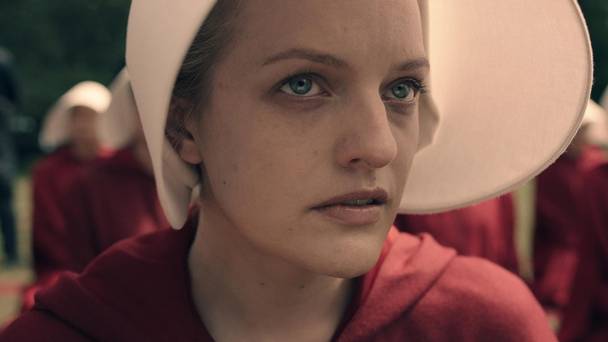“I have reasons. There are always reasons. Sorry, baby girl, Mom’s got to work.” With that line – the by-now familiar mix of the boldly defiant and the glibly smart-arse – we were pitched last Thursday into season three of The Handmaid’s Tale with a double episode on RTE2.
Actually, “pitched into” may be the wrong way to put it. “Dragged down” would be more accurate – dragged down into the tedious morass that this bloated extension of Margaret Atwood’s seminal 1985 novel has become since the end of a brilliant first series, which was showered with 13 Emmy nominations and deservedly won eight.
Once it had used up all of Atwood’s book, there was always a chance that The Handmaid’s Tale would flounder, and it has – badly.
The fall has been so staggeringly precipitous, it makes you wish someone involved in the production had had the good sense to see what was blindingly obvious from the beginning: The Handmaid’s Tale was perfect material for a one-off mini-series. The first season should also have been the last.
The main plot of the novel ends ambiguously with Offred (her real name is never revealed) being led away from the Waterfords’ house to a waiting van.
It remains unclear whether the men who take her away are members of the secret police known as the Eyes, or members of the resistance group known as Mayday, who are posing as Eyes.
A metafictional epilogue set in the distant future and taking the form of a male historian’s address to a conference reveals that what we’ve read up to then is a transcript of tapes recorded by Offred.
We learn that at some point the Republic of Gilead fell and that the United States of America that re-emerged was a more equal society, but we still don’t find out what became of Offred or who she really was – or even if she existed.
It’s a dazzling literary device that throws everything we thought we knew about the story into doubt. Offred, whose every word we’ve taken on trust, is suddenly cast as a potentially unreliable narrator.
The fact that her account of her life as a Handmaid has been interpreted, perhaps even edited, by a man coats the book in a rich irony. In the end, it’s still the men who have the last word.
Sadly, there’s nothing so subtle or clever about season three of The Handmaid’s Tale. If you found yourself shouting at the screen at the end of season two, which, after 12 episodes of tiresome wheel-spinning, delivered a ludicrous finale – June (Elisabeth Moss) spurns her third opportunity to escape – designed solely to keep the character in Gilead, the opening episodes of season three (I’ve seen Thursday’s) don’t inspire confidence that things are going to get any better.
Having hit the reset button once, The Handmaid’s Tale shamelessly hits it a second time, only to give us more of the same tedious, repetitive beats, albeit it without the beatings. The much-criticised violence of season two has been toned down.
She’s now installed in the home of the weird, reclusive Commander Lawrence (Bradley Whitford), the man who offered her the chance to escape. He’s a big noise in Gilead, one of the chief architects of the regime, yet seemingly sympathetic to the resistance. His motives are hard to fathom.
Hard to fathom and hard to care about. You can say the same about The Handmaid’s Tale as a whole. It’s paddling around in the same circle of misery, with absolutely nothing new to say.
Every episode begins and ends with Moss either smirking or scowling into the camera as she spouts a supposedly pithy epigram.
“Don’t let the bastards grind you down” was June’s original mantra. At this point, however, the viewers are the ones being ground down.
Atwood has written a sequel novel, The Testaments, due out in September. Hopefully, it will undo the vandalism that this mess of a series has done to her revered original.
The Handmaid’s Tale is on RTE2 on Thursday at 10.15pm.
Source: Read Full Article
